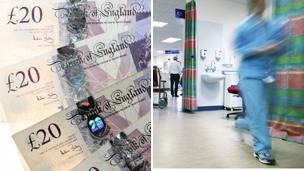Is the NHS really untouchable?
- Published

The NHS has never before had such a sustained period of so little little growth in its funding
The NHS is often considered as nigh on untouchable.
It is why David Cameron worked so hard in opposition to convince voters that the NHS was safe in his hands - he knew without credibility on health the Conservative party would struggle to win votes.
And it is easy to understand why. Polling consistently shows that the NHS is near to the top if not right at the top of the public's priorities.
Last year, a survey by MORI and the Nuffield Trust asked people which areas should be protected from cuts.
At the top, by a clear margin, was the NHS. Nearly eight in 10 suggested it should be protected, compared to 51% for both schools and care of the elderly, the next areas on the list.
Defence, local authority services and benefits were all hovering around the 10% mark.
But does this mean the NHS is completely sacrosanct?
Perhaps not - as research by the King's Fund shows.
The think-tank has been working with Ipsos Mori to carry out some in-depth polling work with members of the public.
Rather than simply asking them a series of questions, the King's Fund held two day-long events with a total of 80 people.
The sample size was deliberately small to allow longer discussions to explore some of the challenges the health service is facing.
'Wake-up call'
What it showed was that while most felt the NHS should remain free at the point of need and any reduction in quality was judged to be "unacceptable" there was still an appetite for quite radical changes.
For example, the events showed there was some support for charging people for cosmetic surgery or elective caesareans, while many agreed people who abuse services, such as drunks who end up in A&E, should be penalised.
There was also a consensus that some form of top-up, perhaps for better accommodation in hospital, should be considered as a way of raising money.
The are obviously caveats. Eighty people is not many and - as any politician will no doubt warn - there are few opportunities in modern politics to debate a single issue in such depth.
But that does not mean there should be no attempt to engage the public in a wider debate about the NHS.
This is arguably the most challenging period for the health service since it was created. Never before has there been such as sustained period of so little growth in the budget.
And it comes at a time when demand is growing from factors such as the ageing population, development of new treatments and rise in conditions such as diabetes and heart disease.
Anna Dixon, director of policy at the King's Fund, hopes it acts as a wake-up call.
"Although difficult choices lie ahead, politicians have been reluctant to discuss the future funding challenge facing the NHS.
"This research shows that people want to engage with these issues.
"With pressures to spend more on health care growing and the public finances likely to be under considerable strain for the foreseeable future, it is time for an informed public debate about how much we should spend on the NHS and how this should be funded."